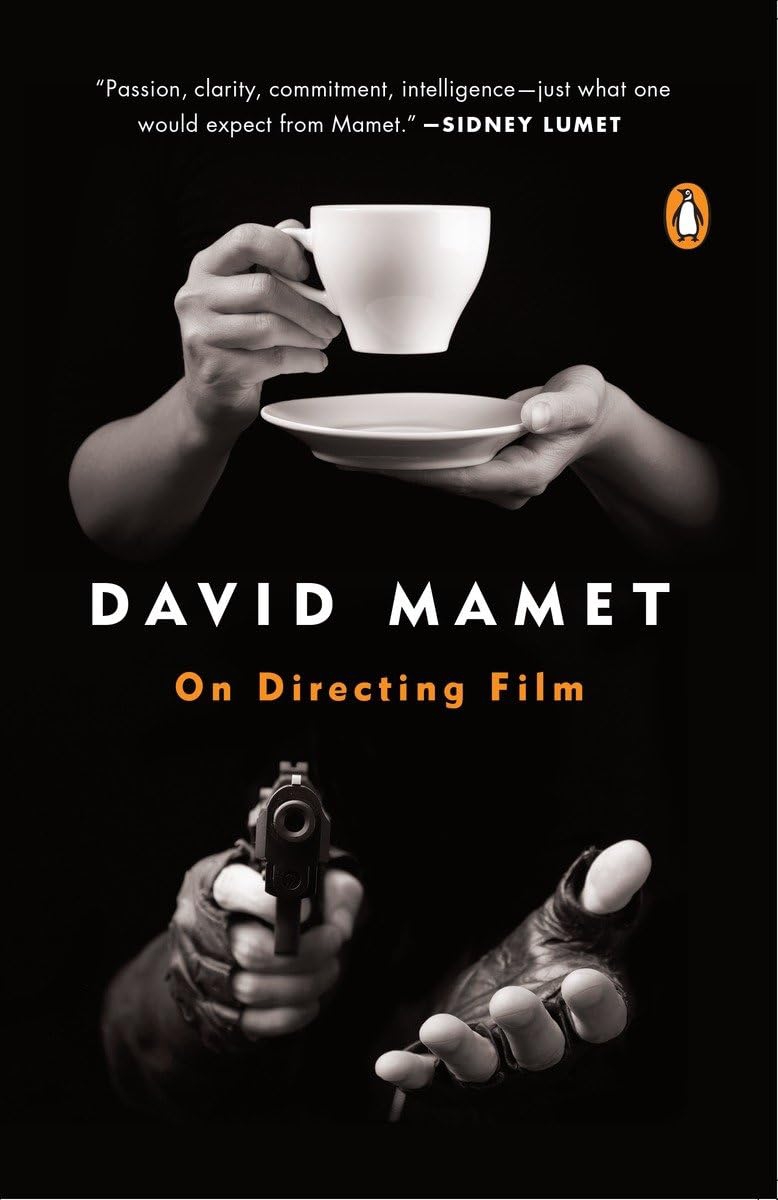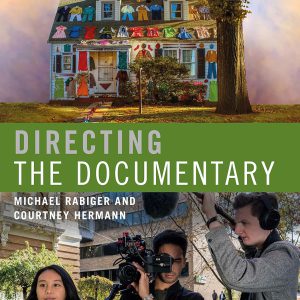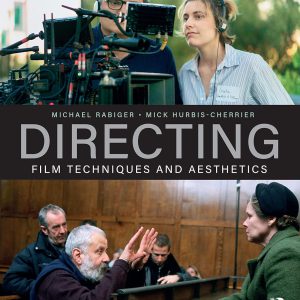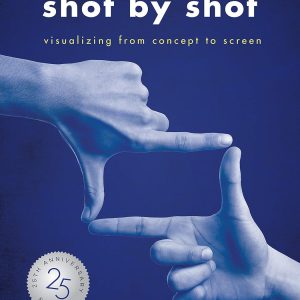Description
Editorial Reviews
Amazon.com Review
According to David Mamet, a film director must, above all things, think visually. Most of this instructive and funny book is written in dialogue form and based on film classes Mamet taught at Columbia University. He encourages his students to tell their stories not with words, but through the juxtaposition of uninflected images. The best films, Mamet argues, are composed of simple shots. The great filmmaker understands that the burden of cinematic storytelling lies less in the individual shot than in the collective meaning that shots convey when they are edited together. Mamet borrows many of his ideas about directing, writing, and acting from Russian masters such as Konstantin Stanislavsky, Sergei M. Eisenstein, and Vsevelod Pudovkin, but he presents his material in so delightful and lively a fashion that he revitalizes it for the contemporary reader.
Review
“Passion, clarity, commitment, intelligence—just what one would expect from Mamet.”—Sidney Lumet, Academy Award-nominated director of 12 Angry Men, Dog Day Afternoon, Network, and The Verdict
From the Back Cover
Calling on this unique perspective as playwright, screenwriter, and director of his own critically acclaimed movies, House Of Games and Things Change, David Mamet illuminates how a film comes to be. He looks at every aspect of directing–from script to cutting room–to show the many tasks directors undertake in reaching their prime objective: presenting a story that will be understood by the audience and has the power to be both surprising and inevitable at the same time.
About the Author
DAVID MAMET is an Academy Award-nominated screenwriter and a Pulitzer Prize-winning playwright as well as a director, novelist, poet, and essayist. He has written the screenplays for more than twenty films, including The Verdict, The Untouchables and Wag the Dog, and has twice been nominated for an Academy Award. His HBO film Phil Spector, starring Al Pacino and Helen Mirren, aired in 2013 and earned him two Emmy Award nominations for Outstanding Writing and Outstanding Directing. He has written more than twenty plays, including Oleanna, The Cryptogram, Speed-the-Plow, American Buffalo, Sexual Perversity in Chicago, and the Pulitzer Prizewinning Glengarry Glen Ross. Born in Chicago in 1947, Mamet has taught at the Yale School of Drama, New York University, and Goddard College, and he lectures at the Atlantic Theater Company, of which he is a founding member.
Read more













Miki Da Shrew –
A few years ago I married a scoundrel–a delusional little man who had taken two whole classes one year at a presigious film school before announcing to the world that he was the next Steven Spielberg, who then spent the next twenty years refusing to get a job because filmmaking was his alleged “destiny.” As it turned out, I really was his muse; obsessed with real-life cable crime dramas about psycho brides who kill their unsuspecting, purely innocent husbands, his family would later tell me, he had hoped that he could get me to snap and become the “write what you know” foil in the horror movie of the century, to gain the wealth, adulation and admiration he so richly deserved. In the years since our not-so-amicable divorce, I’ve been in real film school, taking classes and seminars wherever I can, and working every peon job on every set that will have me because, in a weird twist of life’s true horror, I actually do want to make films, and I want to make them well.David Mamet is one of the great filmmakers that my Peter Pan wanted to pose as, but in reading this book I have learned that everything I had been told about the science of Mamet’s method was completely false. Either Dopey had a far poorer grasp on reading (and watching) comprehension than I ever realised, or he just made it up as he went along. In truth, I learned in reading this book that Film Directing is much more creative and far less pretentious than I’d been led to believe, and this lecture series made me wish that I had chosen Columbia instead of Boise State way back when these classes were first taught.David Mamet’s positive view that the film director is a “Dionysian extention of the screenwriter” makes the prospect much less dull. His philosophy about “letting the story evolve,” how that happens, and allowing the subconcious mind to lead shot sequences and angles is brilliant. But his final advice to “stick to the channel, it’s marked,” is what makes this series of lessons timeless. All of the classes I have taken have left me feeling daunted, worried about the future direction of my path, losing focus in the minutiae of technicality, camera choices, light angles…resisting the urge to pummel bad actors. But then there is the clearheaded, short-and-sweet teaching of Mamet to follow first principles, plotting a sure course, summed up with:”The more time you have invested, and the more of yourself you have invested in the plan, the more secure you will feel in the face of terror, loneliness, or the unfeeling or ignorant comments of those from whom you are asking a whole bunch of money or indulgence.”This book is truly a series of peptalks from a great and humble mentor, and is going into my war chest to be referred back to whenever I need to find the center again. It’s so much more sensible than the ramblings of the idiot I married.
Rico –
Great book that every filmmaker needs in their collection. David Mamet is an icon and one of the greatest artists of our time.
Niander Wallace –
Clear writing. Makes a very simple point.
Marc –
“If a person’s objective is truly – and you don’t have to do it humbly, because you’ll get humble soon enough – to understand the nature of the medium, that objective will be communicated to the audience.”This book is a brilliant study in taking the role of the director and bringing an idea to life through communicating a series of images – the shot list. It’s a book on Directing, but I would just as much recommend it to any screenwriter as well.Mamet works hard to stay away from discussing angles & visual style as he thinks you should (at least in your initial planning) as these are not his strong suits (to which he admits) but instead demands that shots should communicate through staging, action and juxtaposition. Information should not be read or told but questioned, answered and experienced.His points are further stressed through demonstration in workshop format between students and himself in two of the longest chapters near the beginning and end of the book that I quite enjoyed.A strong theme running throughout the book is putting in the hard work will help you to know the job as it focuses heavily on workshopping down to communicating the information in the shot to it’s core which in turn cuts away the fluff making it easier to communicate (in theory) what’s happening in said shot with the sets, props, actors, etc.The book’s back cover purports that this book looks at every aspect of directing – “from script to cutting room floor” – that’s simply not true if you simply learning about film and are just getting into the art form.However if this is a chapter slightly further along on your journey I would HIGLY RECOMMEND this as an advanced masterclass. Not too advanced to understand for anyone by any means – but maybe too advanced to fully absorb… But what do I know. Read it anyways 🙂
SDW67 –
ON DIRECTING FILM, by David Mamet, is one of the best books ever written on the topic. Mamet, a writer/director himself, doesn’t fill up the book’s 107 pages with talk of the technical know-how required by a film director but instead writes about what makes a story compelling; how to communicate to a cast and crew with short and simple directions; how to not pander to an audience but still effectively communicate your film’s intent; in short, how to make a better film. Part of the book consists of transcripts between film students and Mamet when he lectured on directing at Columbia Film School. Mamet and the student’s talk through an imaginary scene, beat by beat, with Mamet never letting them choose the easy route at any time in the process, but instructing them to think like screenwriters, imagining the scene shot by shot. Mamet’s extremely wide vocabulary and commitment to making this book as accessible as possible make it well worth your time to read and, like me, re-read.
Ajinkya Manohar –
Simply the Best.
This book helped me how to practically think and execute the written script. Thanks David Mamet for sharing the real knowledge useful on field.
Amazon Customer –
I like his unapologetic style
Mamet is Mamet. If you know this going in you will enjoy this book. It has all his quirks, though process and preconceived notions. I, for one, enjoy the experience cover to cover.
Carlos Vázquez –
Grandes fundamentos en una lectura breve
El libro está muy bien escrito, tiene apenas más de 100 páginas, por lo que fácilmente lo lees en una hora y te quedas con ganas de volverlo a re-leer para absorber mejor las lecciones.Sin duda es un fantástico acercamiento para entender la labor de dirección. Lo recomiendo si quieres aprender a dirigir y no tienes idea de las labores objetivas del puesto.
Cliente Amazon –
Essencial para o estudo sobre direção e dramaturgia
Apesar de datado em 1991, o conteúdo do livro continua extremamente atual. De forma simples e clara, David Mamet compartilha algumas de suas experiências para nos ajudar no entendimento do processo de construção narrativa audiovisual, desmistificando as lendas Hollywoodianas e estimulando o pensamento crítico sobre a ação de narrar.
Mark S. –
Learnt a lot. Great book
I loved this book but found there was too much quoting class conversations. The example topics were also disturbingly boring (student wanted to get a retraction). Learnt some great things though and am glad to have read this.